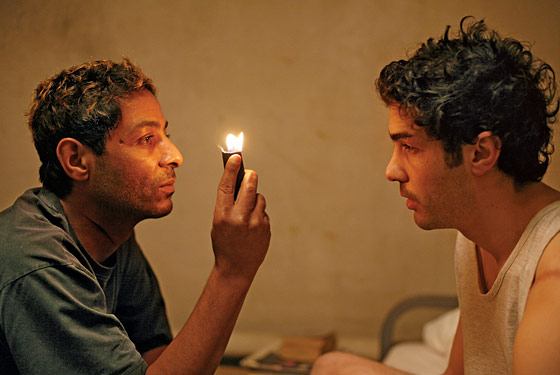
Jacques Audiard’s febrile, engrossing prison thriller A Prophet opens the way tragedies often close, with a man forced to choose between his life and his soul. Malik (Tahar Rahim), a 19-year-old French Arab, is ordered by the prison’s most powerful inmate, the aging Corsican mobster César Luciani (Niels Arestrup), to seduce and slit the throat of a fellow Arab. The teen tries everything (blowing the whistle, getting himself thrown into solitary confinement) to keep from becoming a killer, but César is almighty, and so Malik learns (with much dribbled blood) to conceal a razor in his cheeks and leap from his knees and swing for the jugular. The fatal encounter, when it comes, is gruelingly prolonged, the victim kind and attentive, the violence clumsy and garish, the aftermath chilling. Although he has always been nonreligious and unaffiliated (he grew up in state institutions), Malik is suddenly more than ever a man without a country, protected by Corsicans who call him a “dirty Arab,” despised by Arabs who call him a craven Corsican. But then, slowly, the illiterate Malik learns to read—not just books but the prison itself and the world beyond. With stealth and subtlety, he begins to move between the two cultures and to correct—sometimes brutally—the imbalance of his life.
Audiard is not exactly a cockeyed optimist, but something inside him fights the bleak scenarios to which he’s drawn. He remade James Toback’s fatalistic fever dream Fingers as the romantic, relatively upbeat The Beat That My Heart Skipped, and in A Prophet, he seems to be turning De Palma’s Scarface inside out and finding the core of self-actualizing inspiration that no climactic hail of bullets could puncture. After Malik’s first murder, Rahim’s face turns hard, yet you can feel the character’s brain ticking; you can read him reading others. Audiard’s camera is extraordinarily intimate: The boundaries disappear between the real and the surreal. Malik lies on his cot beside the man he long ago killed, and we accept that the connection is indelible. The murder was the primal injury from which all else flows.
A Prophet isn’t another of those washed-out blue-gray prison pictures. The colors are warm and saturated, the vistas wide. It’s a long film (more than two and a half hours), and when Malik is allowed to leave the prison for twelve hours at a time and begins to form alliances with Italian, Corsican, and Egyptian gangsters, the connections are hard to follow. That’s the price you sometimes pay, though, for filmmakers who zig and zag and resist clicking into an established groove. Rahim is an exciting, unpredictable presence, and Arestrup’s César has a stature that’s nearly Shakespearean. As his cronies leave him behind, his mask of malevolence slips and we glimpse the desperate, bereft old fool. If A Prophet preaches anything, it’s the value of self-reliance.
Some great directors, as they age, strive to simplify and refine their technique in the hope of getting closer to their subjects, but Martin Scorsese has happily—perhaps even with relief—moved into a long and not so emotionally taxing formalist phase (with fat studio paychecks). He seems to have been drawn to Shutter Island by the chance to quote from quasi-horror asylum B movies like Shock Corridor and Bedlam, and to play the kind of straight-ahead illusion-versus-reality games he leaped clean over in his early expressionist masterpieces Mean Streets and Taxi Driver. Dennis Lehane’s novel, about a Boston detective who travels to an insane asylum on a craggy island to investigate the disappearance of a female patient, is a doodle, a Paul Auster Lite breather between his tortured Mystic River and the panoramic The Given Day. But Scorsese draws it out to two hours and twenty minutes of Hitchcock-like tracking shots and bombastic music and shrieking storms and detectives in long coats and fedoras trudging past leering mental patients. It’s all deliberately artificial, of course, and the fifties noir tropes do gradually morph into something weirder and more hallucinatory. But even when the detective-story foundation begins to crumble and the gumshoe protagonist (Leonardo DiCaprio) becomes racked with visions of concentration camps and bloody children and babbles about Communist subversives and Nazi experiments, Shutter Island is still suffocatingly movieish.
DiCaprio had a breakthrough in the much-maligned Revolutionary Road: He sanded off some layers of polish and dared to be raw, wobbly, in the moment. He’s every bit as good here—he’s just not very interesting. He trudges around with his sidekick (Mark Ruffalo) interviewing characters played by great actors pretending to be bad actors (only Ruffalo and Ben Kingsley’s strangely paternal psychiatrist are fun to watch), and it’s all setup for the big reveal of the last 25 minutes. The ending is powerful (it should be, given how Scorsese lingers on the corpses of little kids), but Shutter Island is a long slog. The sad thing is that Scorsese could have connected emotionally with Lehane’s narrative. Without spelling things out, the story comes down to whether fierce self-dramatization can lead to revelation, catharsis, and healing—a question raised obliquely in Taxi Driver and Raging Bull. But Scorsese can’t get past the thicket of old movies. He’s farther from reality than his hero is.
See Also
Scorcese on Collaborating With DiCaprio
A Prophet
Sony Pictures Classics. R.
Shutter Island
Paramount Pictures. R.
